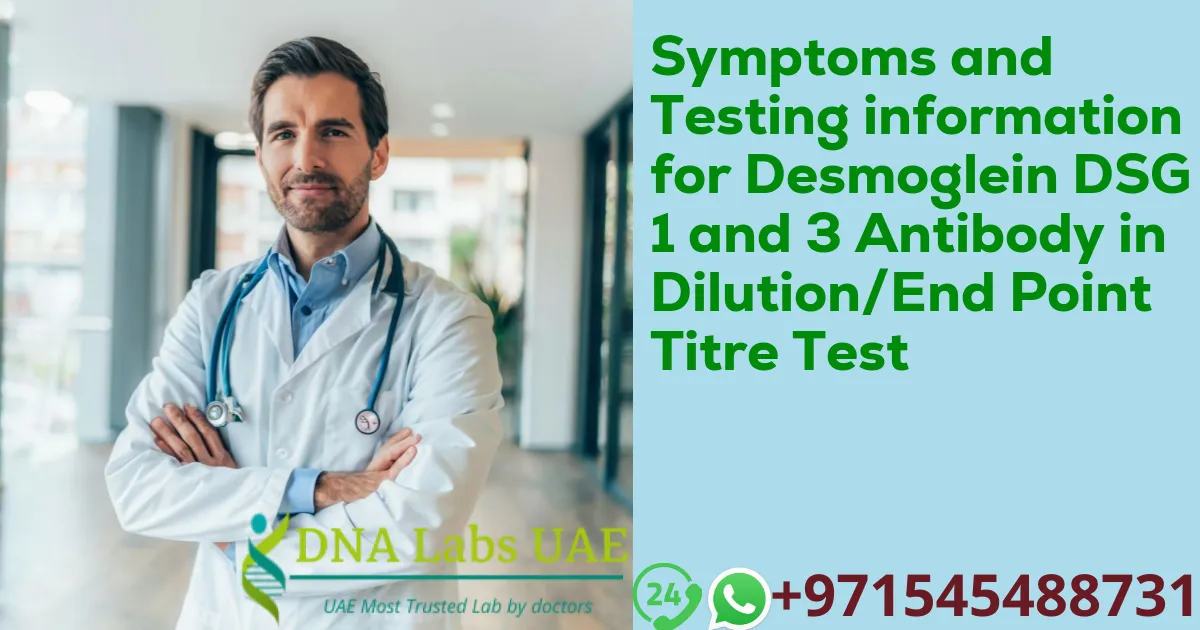—
Understanding the symptoms associated with Desmoglein DSG 1 and 3 antibodies is crucial for timely diagnosis and management of related conditions. Desmoglein 1 and 3 are proteins found in the desmosomes, which are critical for cell adhesion, particularly in the skin and mucous membranes. When antibodies against these proteins are present, it can lead to a group of autoimmune diseases known as pemphigus, which is characterized by blistering of the skin and mucous membranes.
Symptoms associated with antibodies against Desmoglein DSG 1 and 3 vary depending on the specific type of pemphigus. For pemphigus vulgaris, which is primarily associated with Desmoglein 3 antibodies, patients may experience painful blisters and erosions on the mucous membranes, often starting in the mouth. As the disease progresses, the skin can also be affected. On the other hand, pemphigus foliaceus, which is linked with Desmoglein 1 antibodies, typically presents with scaly, crusty lesions on the skin, particularly on the scalp, face, and chest, without mucosal involvement.
Early diagnosis and treatment are vital to managing these conditions effectively. The Desmoglein DSG 1 and 3 Antibody in Dilution/End Point Titre Test is a critical tool in the diagnostic process, helping to quantify the levels of antibodies present and guide treatment decisions. At DNA Labs UAE, the cost of this test is 2110 AED. For more information, please visit [DNA Labs UAE](https://dnalabsuae.com/tests/desmoglein-dsg-1-and-3-antibody-in-dilution-end-point-titre-test/).
It is essential for individuals experiencing symptoms such as unexplained blisters or erosions on the skin or mucous membranes to seek medical advice. Early intervention can prevent complications and improve outcomes.
—
Understanding the Symptoms of Desmoglein DSG 1 and 3 Antibodies
Understanding the symptoms associated with Desmoglein DSG 1 and 3 antibodies is crucial for timely diagnosis and management of related conditions. Desmoglein 1 and 3 are proteins found in the desmosomes, which are critical for cell adhesion, particularly in the skin and mucous membranes. When antibodies against these proteins are present, it can lead to a group of autoimmune diseases known as pemphigus, which is characterized by blistering of the skin and mucous membranes.
Symptoms and Disease Association
Symptoms associated with antibodies against Desmoglein DSG 1 and 3 vary depending on the specific type of pemphigus. For pemphigus vulgaris, which is primarily associated with Desmoglein 3 antibodies, patients may experience painful blisters and erosions on the mucous membranes, often starting in the mouth. As the disease progresses, the skin can also be affected. On the other hand, pemphigus foliaceus, which is linked with Desmoglein 1 antibodies, typically presents with scaly, crusty lesions on the skin, particularly on the scalp, face, and chest, without mucosal involvement.
Diagnostic Importance of the Test
Early diagnosis and treatment are vital to managing these conditions effectively. The Desmoglein DSG 1 and 3 Antibody in Dilution/End Point Titre Test is a critical tool in the diagnostic process, helping to quantify the levels of antibodies present and guide treatment decisions. At DNA Labs UAE, the cost of this test is 2110 AED. For more information, please visit DNA Labs UAE.
Conclusion
It is essential for individuals experiencing symptoms such as unexplained blisters or erosions on the skin or mucous membranes to seek medical advice. Early intervention can prevent complications and improve outcomes.
“`



